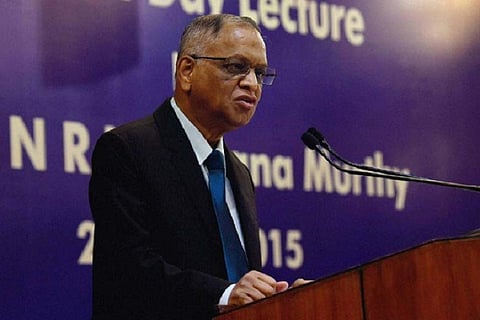

The ongoing dispute between the founders and existing board members of software major Infosys took a fresh turn on Sunday when co-founder Narayana Murthy objected to the pay hike of Chief Operating Officer UB Pravin Rao.
A resolution recently by the company increased the total compensation to Rao to Rs 12.5 crore per annum, i.e. a 35% jump.
Murthy, who had earlier also expressed displeasure over the remuneration of CEO Vishal Sikka, in an email to the media said that Rao's hike was "not proper" and that it will "erode the trust and faith of the employees in the management and the board".
Stating that giving nearly 60% to 70% remuneration hike for a top level professional, including performance-based variable pay, when the compensation increase given to most other employees is usually 6% to 8% "is in my opinion, not proper".
"This is grossly unfair to the majority of the Infosys employees including project managers, delivery managers, analysts, programmers, sales people in the field, entry level engineers, clerks and office boys who are toiling hard to make the company better," he wrote.
Murthy said he always felt that every senior management person of an Indian corporation has to show self-restraint in his or her compensation and perquisites. "He or she has to fight for maintaining a reasonable ratio between the lowest salary and the highest salary in a corporation in a poor country like India."
Speaking to The News Minute, A Velumani, Chairman, CEO & MD, Thyrocare Technologies said that it is usually the management and the Board's call to decide the salary of its employees and that the issue cannot be generalised.
"You cannot tell everybody that this is the kind of hike everybody should get," he said. If the hike is "obscene" though, he added, it may come to the attention of other employees who may question the move.
Personally, Velumani thinks that "vulgar salaries are not good for any organisation". "Having said that, Infosys is too big a company and this salary may not be vulgar. It is up to the management and promoters to take a call. The top should not become too costly, bottom should not become too cheap. Or else there will be huge disconnect. I don't find Narayana Murthy or the Board wrong. They should just not wash their linen in the public."
Founder and chief executive officer (CEO) of Future Group Kishore Biyani is of the opinion that "fairness comes from the concept of equality" and "nobody is created equal in this world". Any difference, however big or small it may be, will still be a difference.
"I believe every company has to decide on their own compensation culture and packages. I think it is their issue and how they deal with it. Markets behave very differently for different kinds of companies," he said.
Biyani too mentioned that the issue cannot be standardised. "At different stages in the life of a company, strategies have to be different. There are some stages where the company needs something different, like different skill sets. I don't think we can take a unilateral view on it."
Murthy's views found support from former Infosys Chief Financial Officer Mohandas Pai who has said that since the company hiked the salary of its CEO, other executives too are expecting the same.
"I think the Board was misguided. You hired a CEO (Vishal Sikka). You are forced by the CEO to increase (his) salary from $7 million to 11 million. There was no justification. When you see CEO getting so much, then COO will say: what about me? I cannot be paid one-tenth of what CEO is being paid. The fundamental error was increasing CEO’s salary from $7 million to $11 million without any justification," Pai told PTI.
He stated that Indian companies cannot follow the West in deciding compensation levels for its employees.
"You can’t compare compensation levels with that in the US because employees (of Indian companies) are all here. A software engineer is paid ₹3.5 lakh. A person who is COO gets paid ₹12 crore or ₹13 crore. 400 times. You have not raised the software engineer’s salary for 7 years. The starting salary for software engineers has not gone up for the past seven years; and the inflation in the last seven years is about 60%," he told the agency.
According to Anil Kumar Pillai, former CEO of JSW Cement, the company's decision to raise the salary of its COO could have simply been a move to retain talent or pay according to industry standards.
Pointing to the pyramidal structure generally followed in most companies, Pillai said that the salary taken by the COO or CEO cannot be compared with that of an employee in the bottom of the pyramid.
"The COO of a company has to deliver on a lot of targets which have been given to him by the Board of the company. And in case he doesn't perform, obviously, their salary will take a hit. Unless the CEO and the COO are adequately paid and rewarded for their efforts, there is no motivation for them to take risks," he said.
"Roles are different. Risk taking abilities are different. For all you know, a large amount of the employees' compensation would depend on the performance of the CEO and COO. We should not draw parallels without understanding the rationale behind the issue," he added.